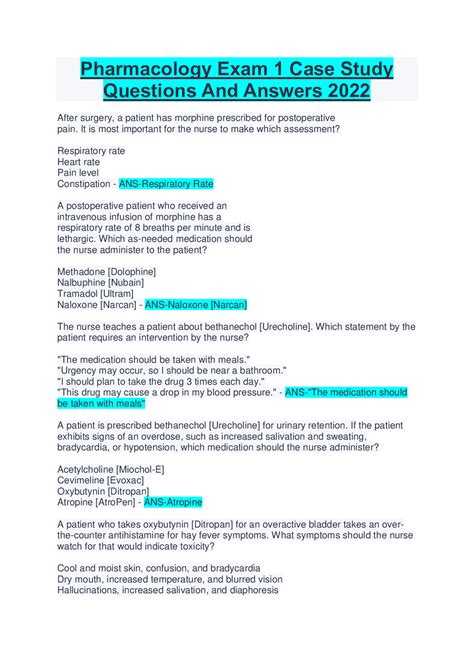Introduction

Pharmacology, the study of drug mechanisms and interactions, is a cornerstone of medical practice. This comprehensive guide will provide you with the essential knowledge needed to excel in your Pharmacology Test 1.
Key Concepts to Master
1. Drug Pharmacokinetics
- Absorption: How a drug enters the body
- Distribution: How a drug is distributed throughout the body
- Metabolism: How a drug is broken down
- Excretion: How a drug is eliminated from the body
2. Drug Pharmacodynamics
- Receptors: Protein molecules that interact with drugs
- Mechanisms of Action: How drugs produce their effects
- Dose-Response Relationships: The relationship between drug dose and its effects
3. Drug Interactions
- Synergism: When two drugs amplify each other’s effects
- Antagonism: When two drugs counteract each other’s effects
- Pharmacokinetics Interactions: Alterations in drug absorption, distribution, metabolism, or excretion
4. Adverse Drug Reactions (ADRs)
- Types of ADRs: Mild to severe reactions
- Risk Factors for ADRs: Age, genetics, comorbidities
- Management of ADRs: Prevention, treatment, and reporting
Practice Questions
Question 1: Describe the route of administration that maximizes drug bioavailability and why.
Answer: Intravenous injection, as it bypasses the absorption and distribution processes.
Question 2: Explain how a competitive antagonist inhibits the effects of a drug.
Answer: By binding to the same receptor site, preventing the drug from interacting with it.
Question 3: List the factors that influence the metabolism of a drug.
Answer: Liver enzyme activity, genetic variations, disease states, and drug interactions.
Tips and Tricks
- Understand the Basics: Focus on the fundamental concepts of pharmacokinetics and pharmacodynamics.
- Practice Calculations: Solve sample problems to improve your understanding of drug absorption, distribution, and metabolism.
- Use Mnemonics: Create memory aids to help you recall complex drug mechanisms.
- Study Regularly: Allocate dedicated study time to review materials and reinforce concepts.
- Seek Help When Needed: Don’t hesitate to ask your instructor or classmates for assistance with challenging topics.
Why Pharmacology Test 1 Matters
Pharmacology Test 1 is crucial because it:
- Provides a Foundation: Establishes a solid understanding of drug mechanisms and interactions.
- Assesses Basic Skills: Tests your ability to analyze drug effects, interactions, and ADRs.
- Prepares You for Clinical Practice: Equips you with the knowledge required to make informed drug decisions for patients.
Benefits of Mastering Pharmacology Test 1
- Improved Patient Outcomes: Enhanced understanding of drug effects leads to safer and more effective prescriptions.
- Increased Confidence: Confidence in your pharmacological knowledge empowers you to provide optimal patient care.
- Career Advancement: Mastery of pharmacology is essential for healthcare professionals seeking advancement in clinical roles.
Novel Applications of Pharmacology
- Personalized Medicine: Tailoring drug therapy to individual genetic profiles to optimize efficacy and minimize risks.
- Drug Discovery: Developing new drug entities with enhanced selectivity and reduced toxicity.
- Pharmacogenomics: Studying the relationship between genetic variations and drug responses to optimize treatments.
Conclusion
Pharmacology Test 1 is not just an examination but a gateway to deeper understanding of drug mechanisms, interactions, and patient outcomes. By mastering the essential concepts and applying practical tips, you can excel in this test and embark on a successful healthcare journey.
Tables
Table 1: Drug Pharmacokinetic Parameters
| Parameter | Definition |
|---|---|
| Absorption | Entry of drug into the body |
| Distribution | Spread of drug throughout the body |
| Metabolism | Chemical breakdown of drug |
| Excretion | Elimination of drug from the body |
Table 2: Drug Pharmacodynamic Mechanisms
| Mechanism | Description |
|---|---|
| Agonism | Drug activates a receptor |
| Antagonism | Drug blocks a receptor |
| Inverse Agonism | Drug inhibits constitutive receptor activity |
Table 3: Adverse Drug Reaction Classifications
| Type | Description |
|---|---|
| Predictable | Expected due to drug’s mechanism of action |
| Idiosyncratic | Unpredictable, unrelated to drug dose |
| Dose-Dependent | Occurrence related to drug dose |
| Time-Dependent | Occurrence related to duration of treatment |
Table 4: Factors Influencing Drug Metabolism
| Factor | Impact |
|---|---|
| Liver Enzyme Activity | Rate of drug metabolism |
| Genetic Variations | Differences in enzyme expression |
| Disease States | Impaired liver function |
| Drug Interactions | Inhibition or induction of enzymes |
